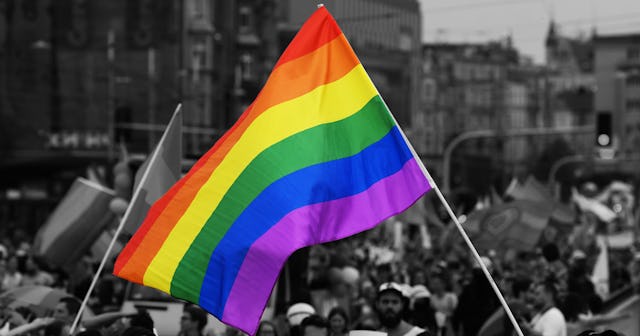If You’re Going To Be An LGBTQIA+ Ally, Stop Showing Your A** And Get Rid Of The 'Buts'

Folks are quick to use the word ally to describe themselves when they think they are open-minded and accepting of LGBTQIA+ people. While not hating queer people or buying some rainbow gear during Pride month are nice gestures, allyship is more than declaring “Love Is Love.” LGBTQIA+ rights are not limited to gay marriage or denied cakes at bakeries. Being an ally means embracing, supporting, and standing up for every sexuality, gender identity, and gender expression even if you don’t understand it. Yet some folks who call themselves allies will include buts, what abouts, and ifs to their “support” because it allows them to avoid discomfort or challenge their mindset in ways they don’t want to examine.
Being an ally means making sacrifices that range from avoiding your favorite fast food chain to losing friends or business. Being an ally means walking away from a church that isn’t safe or accepting of queer people. Being an ally means unlearning biases instead of working around them. Being an ally means you need to stop gaslighting queer people because you place intent over impact.
To really work toward acceptance, change, and unconditional support you need to embrace all aspects of the queer community. You can’t ask queer people to tone down their gender expression. You can’t tell queer youth it’s just a phase or deny who they are because you think they are too young. You can’t purse your lips at the parts that make you uncomfortable or that go against your “beliefs” whether they are based in gender stereotypes, religion, or your misunderstanding of science.
Being an ally means centering the queer person and their experiences without playing devil’s advocate or avoiding the prejudices that make it hard for you to grow and change. Being an ally means being uncomfortable at times; unlike the queer people who don’t get to choose our levels of comfort in this heteronormative world, allies have the privilege of choice.
True allyship can be confrontational, painful, and polarizing at times, and it’s up to you, the person who wants to wave the ally flag and get credit for your “acceptance,” to make changes. The responsibility to make you look good is never on the queer person. We demand unconditional love and support and if you can’t do that then you are not an ally. We shouldn’t have to be patient while you wait for the right time to undo your ignorance or examine what you were taught. We need you to stay and do the hard stuff while listening and deconstructing your preconceived notions.
Telling someone you “love the sinner but hate the sin” when referring to queer people and religion is not allyship.
Allowing discussions that give space to “what about my beliefs” sentiments when they deny the rights or experiences of LGBTQIA+ folks is not allyship.
Saying you love gay people but don’t want to see them show affection to each other is not allyship.
Announcing #translivesmatter but saying you don’t understand or want to acknowledge gender neutral pronouns is not allyship.
AFP Contributor/Getty
Bragging about being an ally but supporting openly anti-queer establishments is not allyship.
Saying you support the LGBTQIA+ community but wish we could blend in more is not allyship.
Telling someone you support the LGBTQIA+ community but then say transgender youth are too young to transition and have access to gender affirming care is not allyship.
I’m a queer nonbinary person, raising kids—one who is transgender—in a country that is not safe for queer and transgender people and families. I shouldn’t feel lucky or relieved because I live in a state that doesn’t have anti-trans bills that will push transgender kids out of sports, subject them to genital checks, deny their rights to medical care, and punish and criminalize parents and doctors who support a transgender child getting the care they need. And the people who live in places where these bills are threatening the safety of transgender kids and their parents shouldn’t have to move to safer places; everywhere should be safe for members of the LGBTQIA+ community. We know this doesn’t happen organically.
We fight and look to allies to join us in these battles, but we need support without conditions attached. There isn’t room for buts, ifs, or what abouts. While the queer folks and transgender youth are fighting for their lives, allies can’t choose comfort and still call themselves allies.
I won’t deny the fact that homophobic and transphobic people will always exist. These bigoted and ignorant people will never be moved from their “beliefs.” But I believe there are more people who could be moved with education, correction, and exposure to queer people and our stories. That’s what allies are perfect for. You get to be the physical and emotional shield between the people who make mistakes, need guidance, or a solid eye roll to get them to embrace queer acceptance and hopefully active allyship.
That may feel like a lot to put on cishet allies, but your privilege in the heteronormative world lets you do this work without the same risks queer people face when standing up for ourselves.
There are so many more aspects to the queer community than the funny gay couple you see on safe, still mostly heteronormative sitcoms. Queerness doesn’t always fit into binary gender boxes. Not all transgender folks want to “pass” as cisgender and aren’t under any obligation to do so, especially for your comfort. Gender expression is vibrant, varied, and worn without constraints of society’s expectations. Religion and queerness can and do co-exist in safe ways. It’s up to the allies to make sure these truths hold up in every aspect of their lives so queer people can navigate inclusive and safe spaces at home, work, in health care settings, and the church without conditions that support cishet privilege.
This article was originally published on